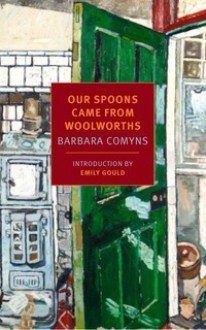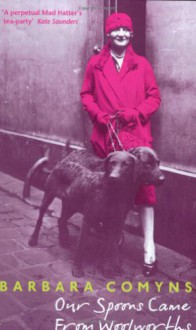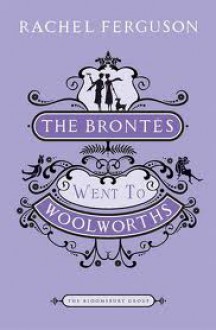
"I told Helen my story and she went home and cried."
Published in 1950, Our Spoons Came From Woolworths is told in the first person by Sophia Fairclough, who meets and marries Charles in the beginning of the book. Her winsome, stream of consciousness narrative is misleading - the early part of the book beguiles the reader into thinking that this is a piece of cheery, lively fiction about a young married couple starting their lives. Charles is an artist, with firmly middle class roots; Sophia is parentless, with a couple of rather uncaring siblings. The book is set in the 1930's, during the global depression between the two wars.
That sense of optimism rapidly devolves into something more akin to horror. Sophia conceives, and having never received even the tiniest bit of education about the reproduction process, is surprised. She believed that just wishing to NOT have a baby would work to counteract conception. No one is happy about this baby - they are too young and too poor and no one is willing to see Charles clearly for what he is.
Which is a dead loss as a human being. He, initially, lives off of Sophia, his father having stopped his allowance once he married. Sophia is working at a commercial studio, and is fired once she has to admit she is pregnant. Her sense of pride prevents her from admitting that this is a terrible hardship. Even after she is let go, Charles does nothing to try to contribute the family coffers.
His family is terrible, blaming Sophia both for the pregnancy, as though she managed that on her own, and for interfering with his ability to develop his great artistic talent. Everyone, including Sophia, seems to accept that it is Sophia's responsibility to keep the young couple in food and housing. This is infuriating, because it literally never seems to occur to anyone that a man should not allow his wife and child to starve, especially during a time period which does not allow pregnant women/young mothers of Sophia's class to work.
The chapters that address the birth of Sophia's son, Sandro, are harrowing. Comyns describes the process of labor in a charity hospital in both explicit and horrifying detail. She is dragged from room to room, never told what to expect, and subjected to the most awful indignities, and once the birth is over, her son is removed to the infant room and she doesn't see him for two days.
It actually gets worse from here. Her marriage is a disaster, her husband is a loser, and their extended family is completely blind to the poverty and hunger that she suffers. Through it all, Sophia's voice remains mostly optimistic and always convincing.
This is, more or less, a book about poverty - about how it grinds and about the experience of being completely powerless due to structural inequalities, such as male supremacy and class-based oppression. Reading it pissed me off, I was so angry at everyone: Charles, for being such an irredeemable asshole; Charles's family for being so monstrously uncaring, and, even, Sophia, for not seeming to find her situation as intolerable as I did. She was so captive to her own circumstances that it seemingly never occurred to her that she should've been able to expect more from her husband and family.
There is one briefly satisfying moment when she loses her temper. She has started a new job and has to walk to work because there is no money in the house. Charles promises to bring her some money in time for lunch, but he blows her off. When it comes time to leave
"I waited to see if he would come fetch me, but again he failed me, so I had to walk home, getting more and more hungry on the way, and angry too. When I arrived home, I saw Charles through the uncurtained window. He was sitting reading with a tray of tea-things beside him. He looked so comfortable, I became even more angry, and dashed in like a whirlwind and picked up a chair and hit him with it."
Even then, though, Sophia is made to feel that she is in the wrong. "I was ashamed of myself, too, but felt too tired to apologize, so just went to bed and wished I was dead."
Even with the grim subject matter, though, there is something fresh and appealing about both Sophia and the book that I can't really explain. It was very frustrating to read, and, although Sophia does get a happy ending, Charles did not get run over by an omnibus, nor did he artistically starve to death, which were the two proper endings for him.
So, I do recommend Our Spoons Came From Woolworths, even if it made me want to hit something.

 Log in with Facebook
Log in with Facebook 









